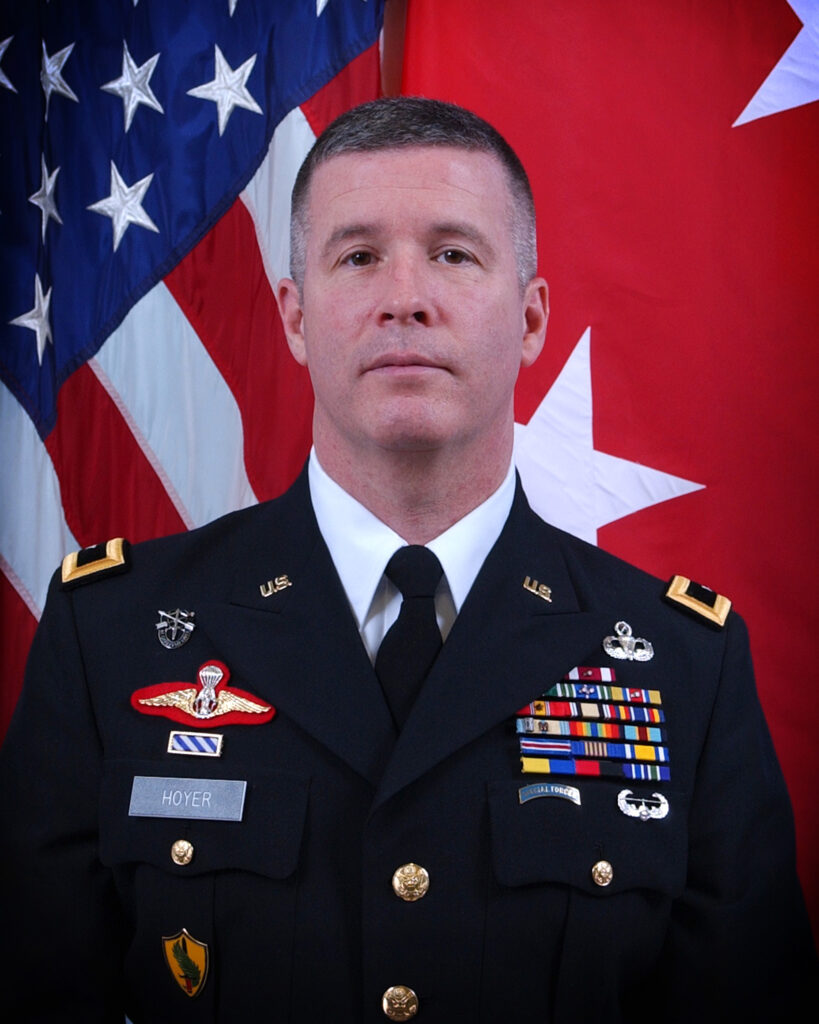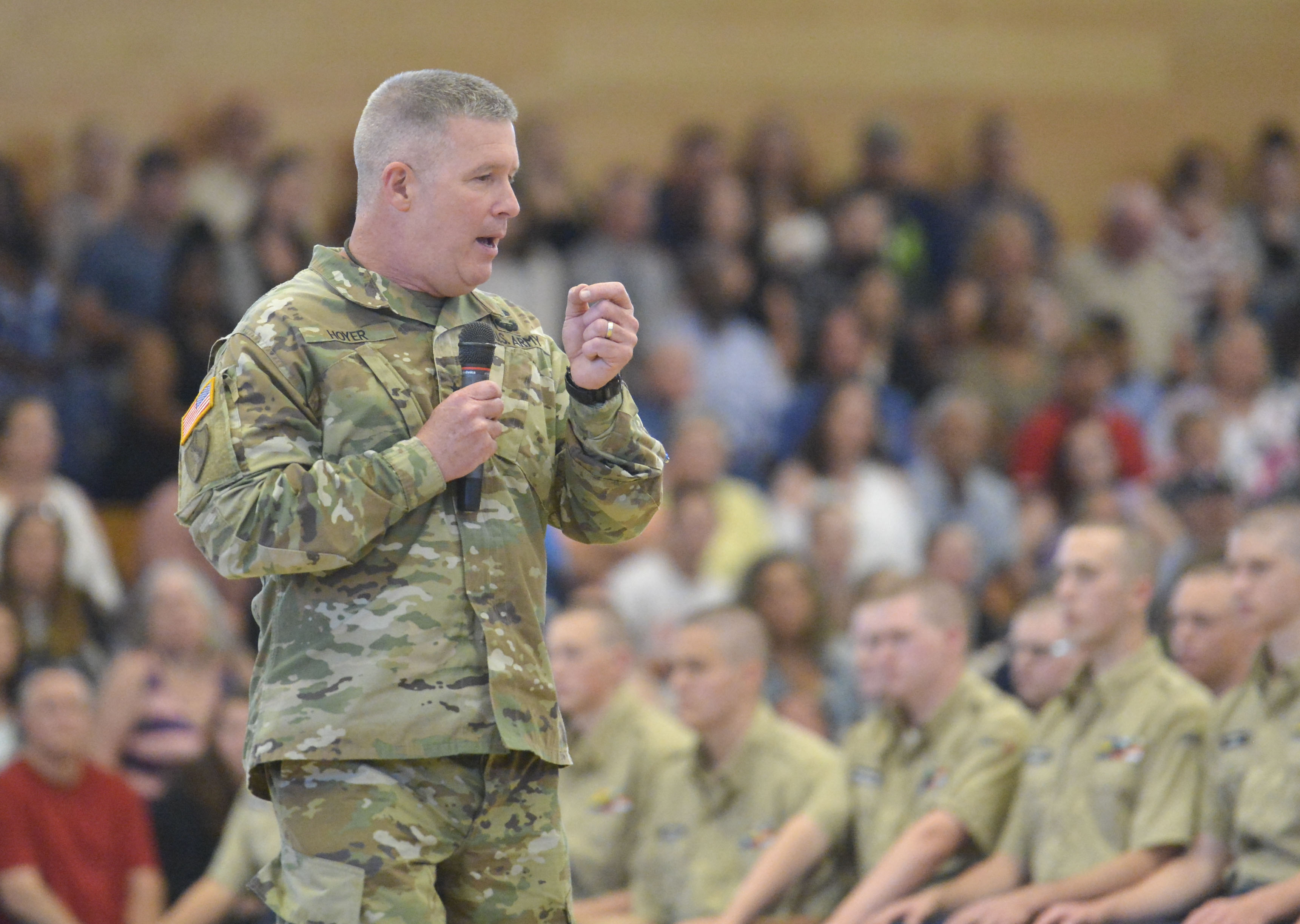MORGANTOWN — When Adjutant General James Hoyer steps down from his post on Jan. 4, he’ll serve a dual role as he transitions to a full-time WVU position in July.
“My wife and I are excited for the next chapter,” he said. “I greatly appreciate what Gordon Gee and Jim Justice have done to give me the opportunity to continue to serve West Virginia. I look forward to making great things happen for the state.”
The Dominion Post talked with Hoyer and with WVU Vice President for Strategic Initiatives Rob Alsop about Hoyer’s transition and future service.

Hoyer said he turns 60 in the spring, the mandatory retirement age for a National Guard general officer. “Between the 40 years of [military] service and the impending mark to retire, my wife and I talked aobutnit and decided this would be a good transition period for us.”
He spoke with Gov. Justice about it over a couple of months, he said. “It just made sense to both of us that this was a good opportunity for me to still be a part of his effort and his team and do it in a different status.”
As it happened, WVU President Gee and Alsop also had asked his retirement plans. “The pieces fell into place.”
Alsop explained that when Hoyer steps down, he’ll remain a part-time state employee. In early January, he’ll also start working by contract with WVU – at $125 per hour – until he assumes his full-time WVU post as senior associate vice president for strategic initiatives, reporting directly to Alsop.
In his state role, they said, he’ll lead the Joint Interagency Task Force on Vaccination, remain a member of the COVID-19 Advisory Team and work with Justice on economic development projects, such as Virgin Hyperloop: The Hyperloop Certification Center in Tucker and Grant counties will perform safety tests required for certification of the transportation technology.
Hoyer and his wife, Amy, moved to Morgantown over Thanksgiving weekend. He said he’ll be commuting between Charleston and Morgantown as his finishes out military duties; his COVID-related work he can do remotely for the most part, though he’ll still have to make trips to Charleston.
As a WVU VP, Alsop said, Hoyer will continue his work with Hyperloop along with growing applied defense research and other WVU economic development projects, and West Virginia Forward initiative – a collaboration of WVU, Marshall and the state Department of Commerce to identify the state’s strengths and weakness and plot a path forward.
“He can really leverage relationships with a lot of entities at the federal, state and local levels and private sector that will provide research and funding opportunities for our students. … We do think that Gen. Hoyer will open up a lot of opportunities for our faculty and staff. We see it as a key strategic hire for the university. It’s going to help not only as we navigate the pandemic but a lot of what we have going on at WVU.”
As Justice’s office has explained, Hyperloop moves people and goods in pods through a vacuum tube at speeds exceeding 600 mph, enabling travel from Pittsburgh to Chicago in 41 minutes. Work on the HCC is expected to begin in 2021 with a planned Welcome Center, Certification Track and Operations Center, Pod Final Assembly Facility, Production Development Test Center, and Operations, Maintenance and Safety Training Center. WVU’s Bureau of Business and Economic Research predicts the total economic impact of the center’s ongoing operation on the West Virginia economy to be $48 million annually.
Hoyer said, “Gordon Gee and Jim Justice have two of the biggest visions I’ve ever seen.” And he’ll continue to work on those development pieces in his WVU role.
“Hyperloop is going to be front and center in that because of what opportunities it presents for West Virginia for job creation, for future technology,” he said.
“But more importantly, if I had told somebody six months ago that West Virginia was going to be a primary candidate for the Hyperloop Certification Center and the next generation transportation system for the United States and for the world, people outside West Virginia would have blown me off as a stupid hillbilly, right?”
And most people in West Virginia would have figured we couldn’t compete, he said. “Well,we got it. And there’s a lot of work that’s going to go making that come to reality.” And some unique opportunities will come along in conjunction that he thinks will transform the state.
Alsop said they are aware some people may perceive conflicts in Hoyer’s new role, asking such things as if his decisions will be biased toward WVU.
“We think Clay Marsh working with the governor has been a great model,” he said. “We see us as on the same team with Gov. Justice and the state trying to solve challenges. We see it as a single team effort. … We’ll be transparent and clear on the different roles. … We don’t think there’s an issue but we think that adds an extra layer of clarity as we work toward this role.”
If someone identifies a conflict they’ll work with Justice to get to a good result, Alsop said.
Alsop expanded a bit more on the evolution of Hoyer’s state role. As they work through calendar year 2021 some of those state duties will reduce, as the vaccination program advances. But it won’t just end.
“As long at the governor needs help from WVU, whether that’s with Clay or Gen. Hoyer, we’ll be there to provide it.”
Tweet David Beard@dbeardtdp Email dbeard@dominionpost.com




